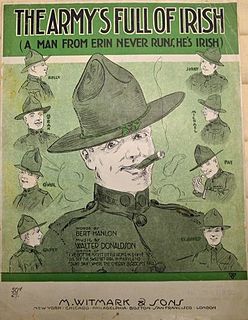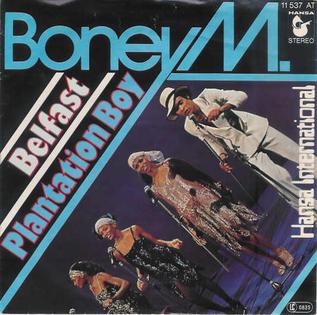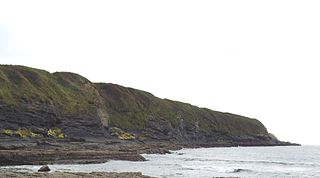 W
WThe Army's Full Of Irish is a World War I song written by Bert Hanlon and composed by Walter Donaldson. The song was first published in 1917 by Witmark & Sons in New York, NY. The sheet music cover depicts a soldier smoking a cigar flanked by eight soldiers with Irish names.
 W
W"Banana Republic" was the first single from The Boomtown Rats' album Mondo Bongo. It peaked at number three in the UK Singles Chart.
 W
W"Belfast" is the second single of the Euro disco band Boney M.'s 1977 album Love for Sale. "Belfast" was the first Boney M. single to feature lead vocals by Marcia Barrett and became their 4th consecutive German chart-topper. In the UK Singles Chart it peaked at No. 8. It remained a popular track in the group's live shows over the years and was re-recorded by Marcia Barrett as a solo track on her album Come Into My Life (2005).
 W
WThe Cliffs of Dooneen is an Irish ballad made famous by Planxty. It is often performed by Christy Moore. The song was written by Jack McAuliffe from Lixnaw, County Kerry about the cliffs around Dooneen Point near Beale, Kerry in the west of Ireland.
 W
W"Give Ireland Back to the Irish" is a song by the British–American rock band Wings that was released as their debut single in February 1972. It was written by Paul McCartney and his wife Linda in response to the events of Bloody Sunday, on 30 January that year, when British troops in Northern Ireland shot dead thirteen civil rights protestors. Keen to voice their outrage at the killings, Wings recorded the track two days later at Abbey Road Studios in London. It was the band's first song to include Northern Irish guitarist Henry McCullough.
 W
W"It's a Long Way to Tipperary" is a British music hall song first performed in 1912 by Jack Judge, and written by Judge and Harry Williams though authorship of the song has long been disputed.
 W
WPagan is the fourth studio album by the Irish Celtic metal band Cruachan released in 2004.
 W
WA Sense of Freedom is the twelfth album by Irish folk and rebel band The Wolfe Tones.
 W
W"Sunday Bloody Sunday" is a song by Irish rock band U2. It is the opening track from their 1983 album War and was released as the album's third single on 21 March 1983 in the Netherlands and West Germany. "Sunday Bloody Sunday" is noted for its militaristic drumbeat, harsh guitar, and melodic harmonies. One of U2's most overtly political songs, its lyrics describe the horror felt by an observer of the Troubles in Northern Ireland, mainly focusing on the 1972 Bloody Sunday incident in Derry where British troops shot and killed unarmed civil rights protesters. Along with "New Year's Day," the song helped U2 reach a wider listening audience. It was generally well received by critics on the album's release.
 W
W"There's No One as Irish as Barack O'Bama" is a humorous folk song written in 2008 by the Irish band Hardy Drew and the Nancy Boys, and set to a tune derived from a traditional air. The song celebrates the Irish ancestry of the former President of the United States, Barack Obama. The song was a minor hit in the Irish Charts, peaking at Number 24 in November 2008.
 W
W"When Irish Eyes Are Smiling" is a lighthearted song in tribute to Ireland. Its lyrics were written by Chauncey Olcott and George Graff, Jr., set to music composed by Ernest Ball, for Olcott's production of The Isle O' Dreams, and Olcott sang the song in the show. It was first published in 1912, at a time when songs in tribute to a romanticized Ireland were very numerous and popular both in Britain and the United States. During the First World War the famous tenor John McCormack recorded the song.